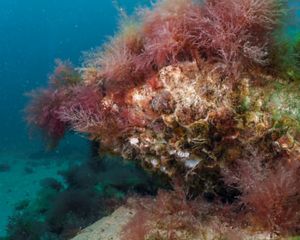Media Contacts
-
Tony Jupp
Associate Director of Communications
Email: tjupp@tnc.org
The Nature Conservancy is thrilled to announce that construction of new Blue Mussel reefs in the Swan-Canning Estuary has commenced.
“After more than a year of planning, we’re very excited to have started construction of trial mussel reefs across 16 pilot sites between Applecross and Bicton", said Dr Fiona Valesini, Marine Operations Manager at The Nature Conservancy. “These reefs will help us refine our shellfish reef restoration techniques – developed over decades of experience around the world – for local conditions.”
Building the pilot reefs will involve deploying about 400 cubic metres of natural limestone across the 16 sites, each reef will have a footprint about the size of a large living room. This will provide a sturdy base on which the mussels can grow.
“The next step will be in August when we ‘seed’ these rocky reefs with millions of juvenile mussels grown locally at the Harvest Road Oceans mussel farm in Cockburn Sound,” added Dr Valesini. “They and any wild born mussels will then start to colonise the reefs along with many other plant and animal species.”
The results gleaned from the pilot will test the feasibility of this method and inform locations to build the full-scale reefs, which will be spread over an area of up to 10 hectares, and are planned for construction in the second half of 2021. These will be subject to a community consultation process. The objective is not to provide mussels for people to eat, but functioning reefs for all the other benefits they bring to the Swan-Canning Estuary such as helping improve water quality, enhancing fish stocks and other marine life, and providing jobs for the local economy.
The pilot reefs will be up to half a metre high and all be under a minimum of three metres of water posing no risk to boating. During construction, local residents may see some limestone plumes in the estuary which will be temporary and closely monitored.
A project of this nature has many partners and comes after careful planning, consultation and research led by The Nature Conservancy with support from Murdoch University, The University of Western Australia, the Western Australian government (Departments of Biodiversity, Conservation and Attractions; Primary Industries and Regional Development; Transport; Planning, Lands and Heritage), and Recfishwest.
This work has been made possible through the funding support of Lotterywest; The Minderoo Foundation; the Department of Biodiversity, Conservation and Attractions; and some of WA’s most respected philanthropists.
The Swan-Canning Estuary project is part of The Nature Conservancy’s National Reef Building Project that aims to rebuild 60 shellfish reefs alongside communities who need them most around southern Australia. If achieved, it will make Australia the first country in the world to recover a critically endangered marine ecosystem. Projects in Melbourne’s Port Phillip Bay, South Australia’s Gulf St Vincent and Western Australia’s Oyster Harbour are in advanced stages of reconstruction with others getting underway in Mandurah, Adelaide, Noosa and now Perth.
The Nature Conservancy is a global conservation organisation dedicated to conserving the lands and waters on which all life depends. Guided by science, we focus on getting things done efficiently and with the greatest positive impact for conservation. We’re a trusted organisation working in more than 70 countries and territories around the world on innovative solutions to our world’s toughest challenges so that nature and people can thrive together. To learn more about The Nature Conservancy in Australia, follow us on Facebook.



